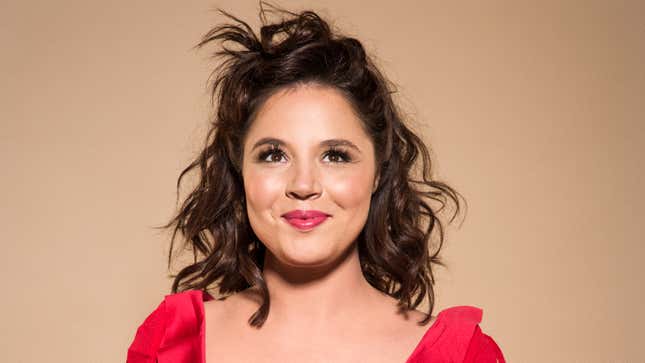You're the Worst's Kether Donohue On the Show's Untraditional Rom-Com Conclusion
Entertainment
Photo: Robyn Von Swank
Somewhere around the 20-minute mark of our phone call, Kether Donohue warns me that she might cry. “I’m going to get emotional… again,” her voice cracks, but she catches it in her throat, and shifts into a joyful, appreciative laugh. It’s not unlike something her character, the hilarious and consistently underestimated Lindsay Jillian, would do on You’re the Worst, the FXX original romantic comedy about fuckups. She laughs, because she’s pleased that she’s realized the series will end the way it began: as a conventional tale told “without convention.” When the Season 5 finale airs on Wednesday (April 3), Donohue will be forced to say a final farewell to Lindsay, BFF to protagonist Gretchen Cutler (played by Aya Cash), and the role that broke her career.
Like most romantic comedies, You’re the Worst follows a love story, the on-again, off-again partnership of Gretchen and British narcissist Jimmy Shive-Overly (Chris Geere). And like most romantic comedies, their best friends—Jillian, and Jimmy’s closest companion and Iraq War vet Edgar Quintero (Desmin Borges)—act as the moral and comedic center of the series. Jillian’s friendship with Cutler is one of the show’s many realistic, kind and often ugly portrayals of human interaction that makes You’re the Worst one of the engaging shows on television, to the point that I wouldn’t be surprised if it becomes a cult favorite for future generations a la Freaks and Geeks. Last week, I spoke to Donohue about some of Jillian’s most memorable moments and what You’re the Worst means for the rom-com genre. This interview has been condensed and edited for clarity.
JEZEBEL: So You’re the Worst is over.
KETHER DONOHUE: I’m not going to lie, I cried for, like, 10 minutes before this call. Oh fuck, I don’t think I’ve processed all of this. I intellectually know it’s over, and I say the words that it’s over, but I don’t think I’m emotionally, viscerally, feeling the reality of it. It’s really sad.
And then, of course, you have to talk about how sad it makes you to a million interviewers.
I know. I think it’s good; I think it’s therapeutic. This is kind of like a therapy session. I’m gonna cancel my appointment. I’m going to use Season 5 press as therapy. I’ll submit my phone bills for a tax write-off.
I don’t know if I can condone that, but I appreciate the sentiment! And for what it’s worth, I’m sure fans of the show find it to be therapeutic for them.
It’s been therapeutic for us, too. Hearing when it has resonated—with the depression storyline, anything that has resonated with someone… I think it’s therapeutic in a lot of ways.
-

-

-

-

-

-

-

-

-

-

-

-

-

-

-

-

-

-

-

-

-

-

-

-

-

-

-

-

-

-

-

-

-

-

-

-

-

-

-

-








































